
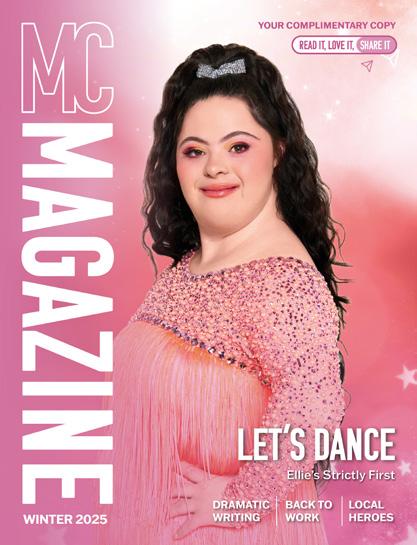




“One kind word can warm three winter months” — Proverb.








“One kind word can warm three winter months” — Proverb.

As we wrap up warm and gear up for the holiday season, it’s important to find moments for ourselves.
Getting help when we need it can make all the difference, from bringing up baby to finding a new job. Nurse Rachel stays strong for others but recognised when she needed help after giving birth to baby Oliver (page 4). Giving help also reaps real rewards – Justine and James (page 14 and 15) tell us how volunteering changed their lives for the better.
There may be twelve drummers drumming in the well known winter nursery rhyme but one psychiatrist with a selfconfessed lack of rhythm, has discovered a new skill which is
helping her as well as women and children asylum seekers. The benefits of listening and playing music together are clear when James describes (on page 12) how the humble tambourine helped him after losing his dad.
A letter to a renowned playwright led to a Mersey Care psychiatrist inspiring a gritty BBC drama. Lisa Wright tackles the difficult issue of child abuse and how therapy can help reduce future reoffending (page 6).
Heroes, hopes and dreams are behind Abdi Ahmed’s tribute (page 24) to people who shaped his life growing up in Toxteth. Read how mutual respect and connections give him hope for the future.

Stay well with our guide on how to avoid falls both inside and outside the home (page 20) whatever your fitness, and pack a punch with protein rich meals.
Winter is a time to take stock, assess and prepare for the spring, which is just around the corner.
We hope this issue helps you look after yourself and others. The MC Magazine team.
“Don’t be afraid to ask for support. You’re not alone.”


Aheady mix of emotions and hormones means pregnancy and new parenthood can be a challenging time. When ‘challenging’ becomes ‘overwhelming’, the right support can make all the difference.
Rachel Rogan from Liverpool had managed her anxiety for more than ten years with medication but stopped taking it when she discovered she was pregnant. Three months into her pregnancy, she was struggling. After confiding in her midwife, she
was referred to Mersey Care’s perinatal service which she says was, “the best thing that could have happened.”
The service provides support to anyone who is experiencing, or has a history of, severe mental health problems and is planning to have a baby, is pregnant, or has a child under the age of two.
“I’ve always been a worrier and I felt I had this support network like a big umbrella, calming me and keeping me safe.”
The perinatal consultant reassured Rachel that her dose of medication was safe to take during pregnancy and reviewed it regularly to put her mind at rest. As well as clinical advice and Cognitive Behavioural Therapy, the team supported Rachel throughout her pregnancy and as a new mum to baby Oliver.
“Midwives and practitioners checked in with me regularly. Through highs and lows, they were always there when I needed someone to talk to.”
The team encouraged Rachel to meet other mums at their
Walking and talking with others combines exercise, social connection and the calming effects of nature. Find a local group near you at mamafituk.com
More parent and baby sessions can be found at:
toddleabout.co.uk
happity.co.uk
nct.org.uk

How can I get help from the perinatal team?
Scan the QR code to contact your local team
Compassionate Care Group.
“As a new mum, you often put yourself last but talking to others helped me realise I needed to take care of myself so I can look after Oliver.”
She was also encouraged to join a mums’ walking group, which boosted her physical and mental health.
“Getting out of the house, regular exercise and making new friends with people in the same boat, really helped to lift my mood.”
A nurse herself, Rachel is used to having to stay strong in difficult situations but thinks she would have struggled without the team.
“Being Oliver’s mum is the best thing in the world but becoming a new parent can feel isolating at times. Now I’d tell anyone - don’t be afraid to ask for support. You’re not alone.”
One in five women will experience mental health problems during pregnancy or in the first year after birth. If left untreated it can have significant and lasting effects. Cheryl Finnigan, team manager of Liverpool and Sefton Specialist Perinatal Service, says, “Pregnancy is one of the
biggest risks to mental health. Advice about the risks and benefits of medication, talking therapies and occupational therapy, are all part of the jigsaw of compassionate care and support we deliver, depending on what is needed and when by each individual family. We are here to help the whole family thrive.”


A raw depiction of child sexual abuse within a family hit our TV screens this year. We talk to the psychologist who sparked the idea to show the bigger picture through drama.
The morning after Liverpool playwright Jimmy McGovern’s Unforgivable aired on the BBC, Consultant clinical psychologist Dr Lisa Wright had a call from a friend – it was being talked about at her local hair salon.
The 90 minute drama shows the Mitchell family struggling in the aftermath of an act of sexual abuse on young teenager Tom, by his uncle Joe. The complexities of a tragic situation grow with the revelation that Joe himself was abused as a child.
Lisa had written to McGovern about Mersey Care’s Forensic Psychology Service, the country’s only NHS service offering psychological therapies to prevent violent or sexual crimes. He later told the BBC he’d felt ‘compelled’ to dramatise a story Lisa shared when they met, of a man who had only realised his own abuse during therapy.
Lisa advised scriptwriters using her experience of working with people who are sexually attracted to children and desperately want to change. Most, but not all, have been abused themselves as children.
She feels drama can simplify complex issues,
“It can explain and help inform opinion on topics we’d rather not think about. Child sexual abuse happens, we can’t ignore it.”
In Unforgivable, Joe undergoes Eye Movement Desensitisation and Reprocessing (EMDR), a therapy that helps process distressing memories of trauma. Through the therapy Joe recognises his own abuse by his football coach.
Lisa explains, “Childhood memories affect how we think as adults. If, as a child, you’re told by someone you trust that what they are doing to you is because they care, those memories influence how you think, feel and behave as an adult.
“Like many people who are sexually attracted to children, Joe doesn’t view what happened to him as abuse. As a child he made sense of it by seeing it as consent with someone he looked up to. It’s only during therapy he begins to see the true picture.
“It helps him see what happened in a more realistic way. He thinks, ‘This wasn’t love or kindness. I was just a child - I didn’t understand. I didn’t want it.’”
Neither Lisa nor Jimmy McGovern sought sympathy or forgiveness for fictional or real perpetrators; rather to raise awareness of the topic – and crucially to prevent victims becoming abusers.
Lisa is clear that not everyone wants to change. But for those who do, the approach is highly successful.
“For Joe and people like him, therapy helps them stop associating the abuse with positive or sexual feelings. They become more emotionally connected to the truth of what has happened to them and so more deeply remorseful about what they have done, or could do, to others.”
McGovern told the BBC he believes people will learn from watching Unforgivable. He said, “Even though we’re talking about child abusers, I still think there’s a need for compassion. Caution yes, punishment yes, justice yes … but alongside all that, an element of compassion.”
For Lisa it’s about reducing future offending. “If we don’t change how abusers think and behave, there’s a good chance they’ll come out of prison and offend again. Above everything else our aim is fewer victims.”
Unforgivable starring Bobby Schofield, Anna Maxwell Martin, Anna Friel and David Threlfall, is available on BBC iPlayer.


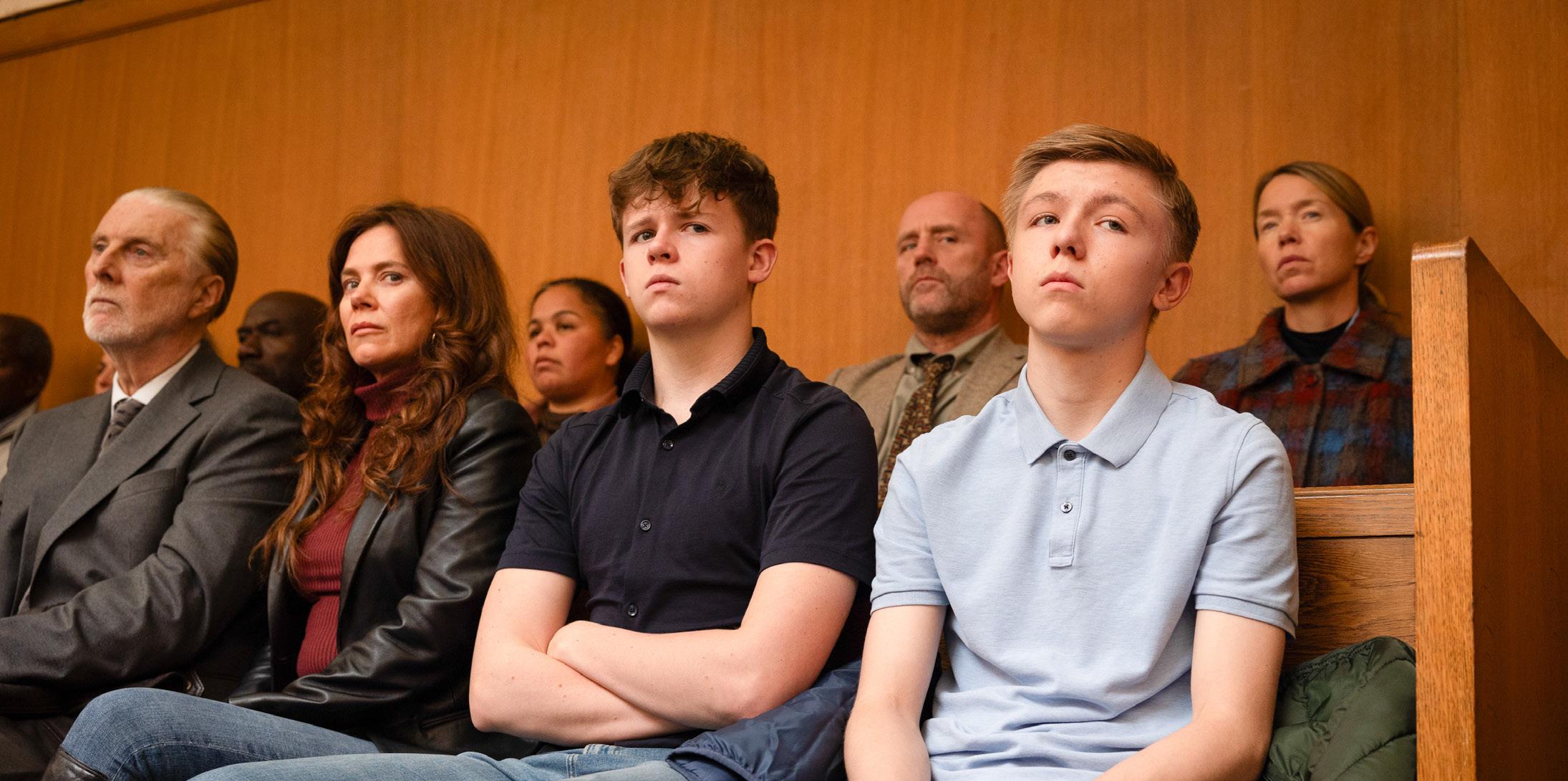
Children can be sexually abused in many different ways, including online and the more we all understand about child sexual abuse, the better we can protect them. Abusers come from all walks of life and often children are abused by someone they know and trust.
AI (Artificial Intelligence) tools can now be used to create lifelike images of almost anything, including child sexual abuse. It is illegal to create, view or share any images of child sexual abuse, even if they have been artificially created.
Spend more or less time than usual online
Seem distant, upset or angry
Be secretive about what they’re doing online
Help give children a voice by being aware of signs of sexual abuse including:
If a child talks to you about sexual abuse it’s important to listen carefully to what they’re saying. Try not to push them too much but allow them time to talk freely and answer. Let them know they’ve done the right thing by telling you and that it’s not their fault.
• Avoiding or being frightened of people or a person they know
• Language or sexual behaviour you wouldn’t expect them to know
If you suspect a child is being sexually abused, take action:
• Get advice or report your concerns anonymously to the NSPCC on 0808 800 5000 or visit nspcc.org.uk
• The Lucy Faithfull Foundation supports anyone with a concern about child sexual abuse and its prevention: lucyfaithfull.org.uk
Rush to get online or on their phone at a certain time
Have new phone numbers, texts or email addresses
Ask for money, they could be being blackmailed
Drop hints and clues.
• Having nightmares or bed wetting
• Alcohol, drug use or self harm
• Change in normal behaviour, like not attending school.
• If you’re a child, you can get help and advice from Childline – call 0800 1111. Calls are free and confidential
• If you are worried about your own or someone else’s sexual thoughts, feelings or actions, online or offline, Shore’s services are anonymous: shorespace.org.uk.
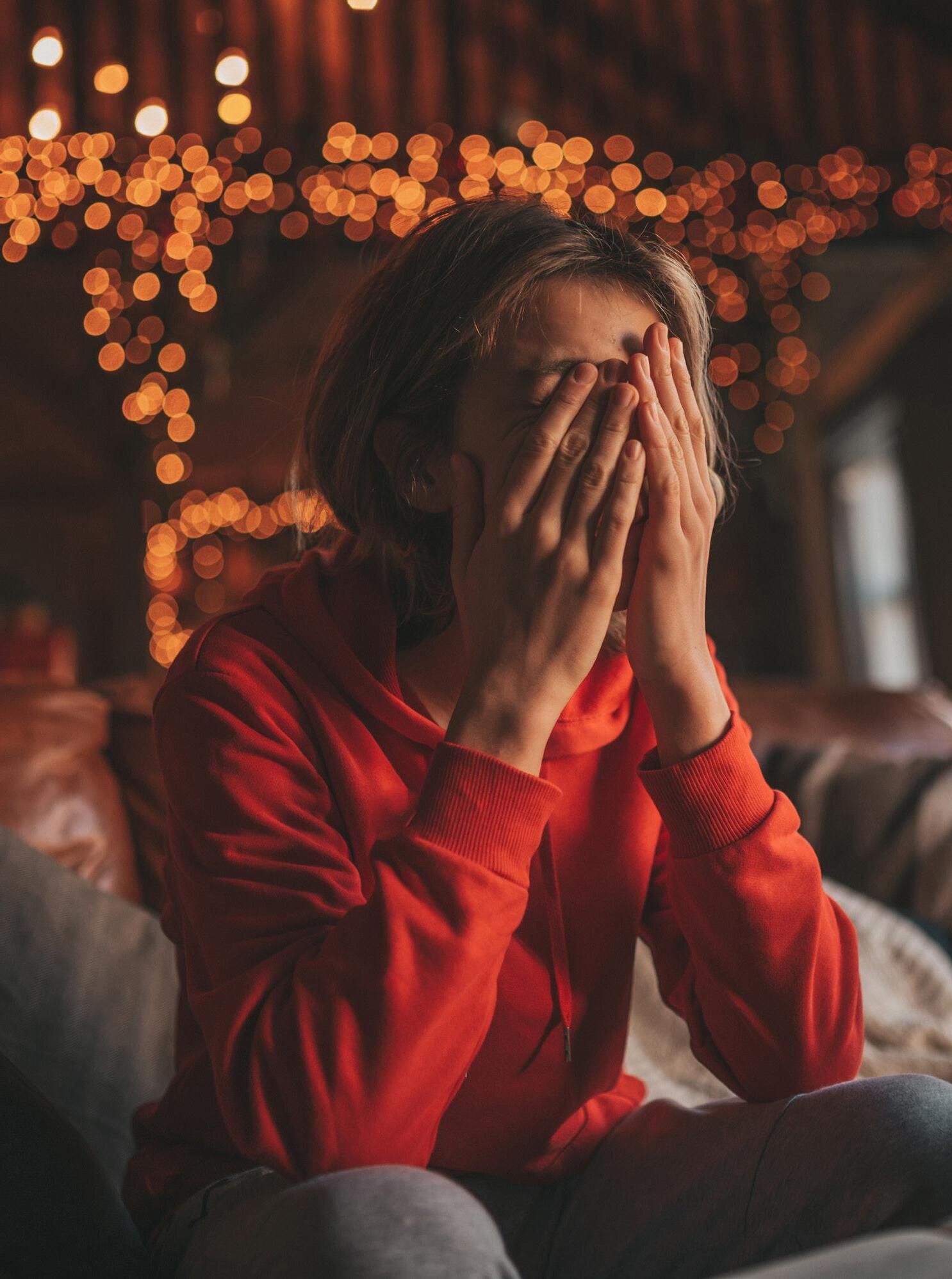
As winter holiday season approaches so does a sense of dread for people living with domestic abuse.
Abuse can happen against anyone and anyone can be an abuser. It may include physical, emotional and sexual abuse between couples or from family members. Triggers can include financial stress, pressure of providing the perfect celebration and increased alcohol at social gatherings.
This can often lead to more verbal attacks, physical violence and emotional manipulation.
Ironically, victims may feel more isolated because people they would reach out to are within their own families, or support centres and networks are sometimes closed. Abusers can use this to reinforce control over the victim.
The National Domestic Abuse helpline run by Refuge asks:
Do you feel like you are walking on eggshells?
If the answer is yes to any, find out more and get help from refuge.org.uk or call 0808 2000 247 for free at any time, day or night.
If you’re worried that you are behaving abusively in your relationship, call the free Respect Phoneline on 0808 802 4040.
If you identify as LGBTQ+ call Galop on 0800 999 5428 or email help@galop.org.uk for emotional and practical support.
For help with forced marriage and honour crimes, call Karma Nirvana on 0800 5999 247 (Monday to Friday, 9am to 5pm), call the Government Forced Marriage Unit on 020 7008 0151 or visit: gov.uk/stopforced-marriage. Do you change your behaviour because you are frightened of your partner’s reaction? Is your partner jealous or possessive? Do you feel controlled or isolated?
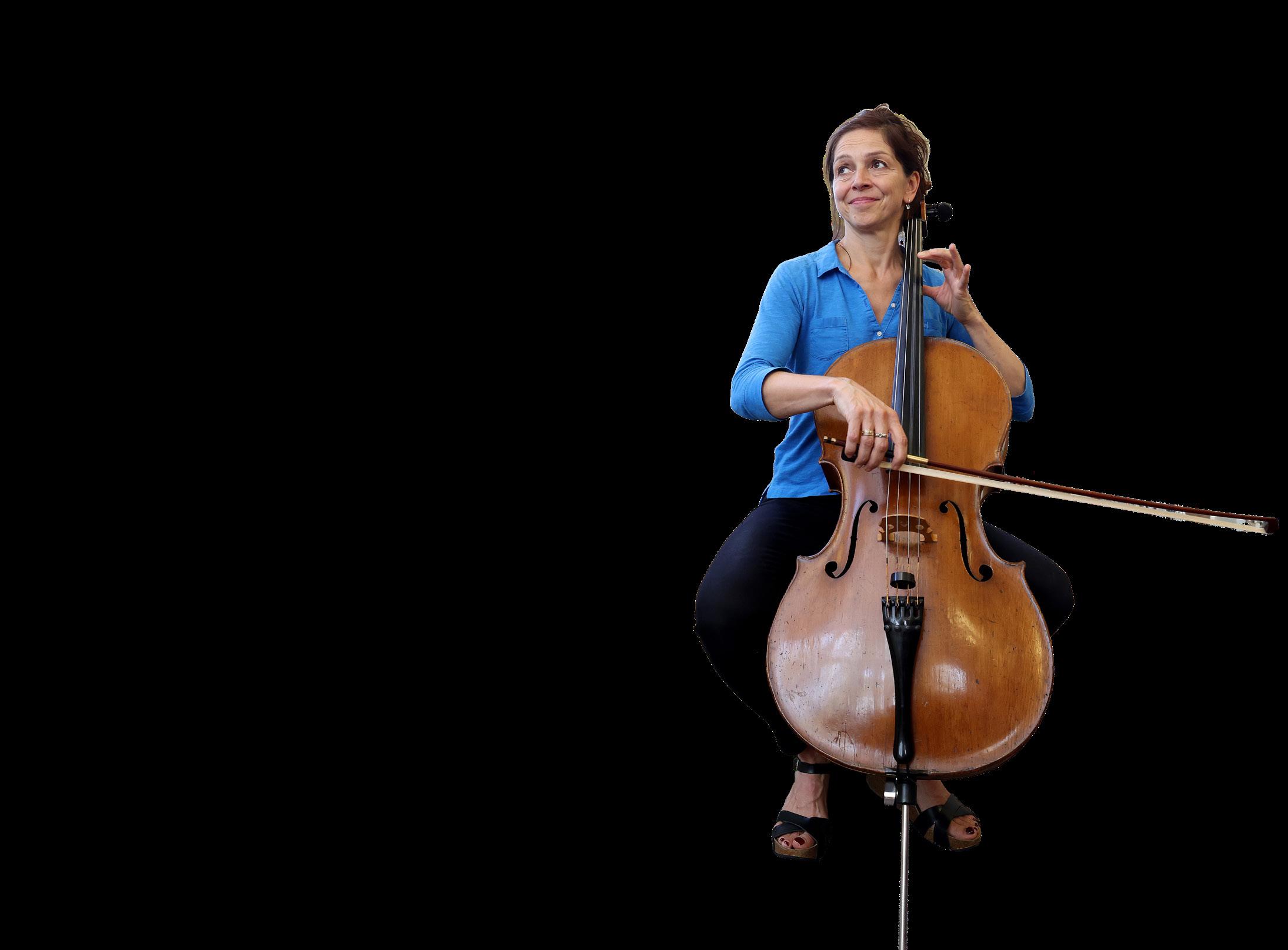
Music plays a part in significant moments of people’s lives - from sporting anthems to wedding dances, lullabies to funeral laments. A carefully curated playlist tells the one you love exactly how you feel.
Cellist Georgina Aasgaard has first hand experience of its power. Since 2008 she has been working with mental health patients and service users as part of the Royal Liverpool Philharmonic Orchestra’s ‘Music and Health’ project with Mersey Care. Witnessing music’s transformative effect on patients with conditions like depression, dementia and schizophrenia has been, she
says, “the musical adventure of my life.”
The project aims to harness the power of music, from Bach to hip-hop, to increase people’s confidence, self esteem and sense of wellbeing. From patients in Mersey Care’s secure hospitals to service users in The Life Rooms, Georgina has witnessed how positive playing and listening together can be.
“I normally play to a full concert hall with the audience in darkness. This project has made me aware of the impact music can have on one individual person. As we listen, we go on an emotional journey together. There is a visible transformation in everyone, including the musicians.”
“Music seems to create a safe space for people to open up and talk about feelings and memories they might not have been able to share before.”
In the BBC drama Riot Women, written by Sally Wainwright, women deal with issues from suicide and child abuse to misogyny and the menopause. Writing and playing rock music together, helps the characters open up about their emotions and rediscover their own identities.
Georgina’s experience is shared by medical professionals and Mersey Care staff.
Michael Crilly, Director of Social Health and Community Inclusion

at The Life Rooms, describes the project as, “the ultimate in whole person care.” He says, “Music is a great leveller, creating close bonds.”
He recalls a young man listening to songs that reminded him of his grandma, who was then able to start talking about emotional experiences from his childhood. Another man rapped out the rage he was struggling with.
“I’ve seen people open themselves up to other treatments for the first time after being part of the music group –it’s like they’ve been lifted into another place.”

Dr Christopher Findlay, consultant psychiatrist and trauma therapy specialist at Mersey Care, cannot imagine living healthily without music.
“For millennia, humans have stayed connected through drumming and singing - we are wired for it.
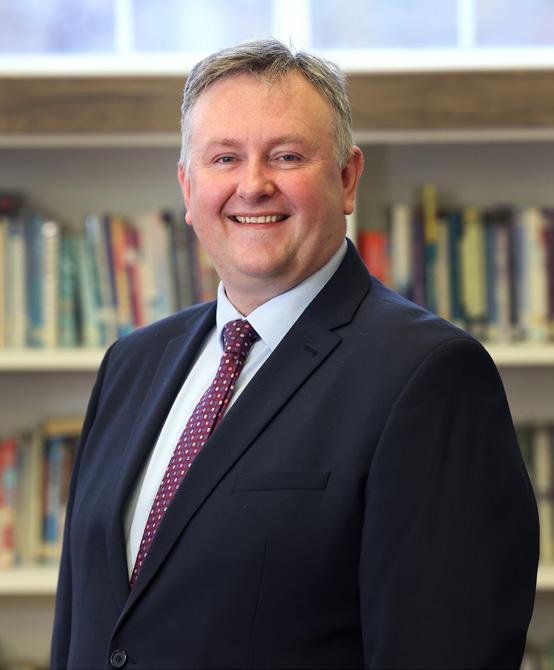
As a musician with one of the UK’s oldest orchestras, Georgina describes music as her life companion.
“Sharing music through this project has pushed my musical boundaries. Nothing gives me more joy.”
“Playing or listening to music with others creates a feeling of community and builds trust. People can then become an active part of their own recovery.
“Listening to music causes a surge of the love hormone oxytocin and dopamine, a chemical linked to pleasure and reward. Hearing songseven sad ones - which reflect someone’s own life experience, can help put emotions into words. Mental health issues like depression can be caused by feeling isolated and misunderstood. Through music, the listener understands they are part of a larger human experience, not someone struggling alone. Social connection is so important in recovery and music can help greatly with this.”
Credit: BBC Pictures

James took part in the Music and Health project at The Life Rooms, Walton
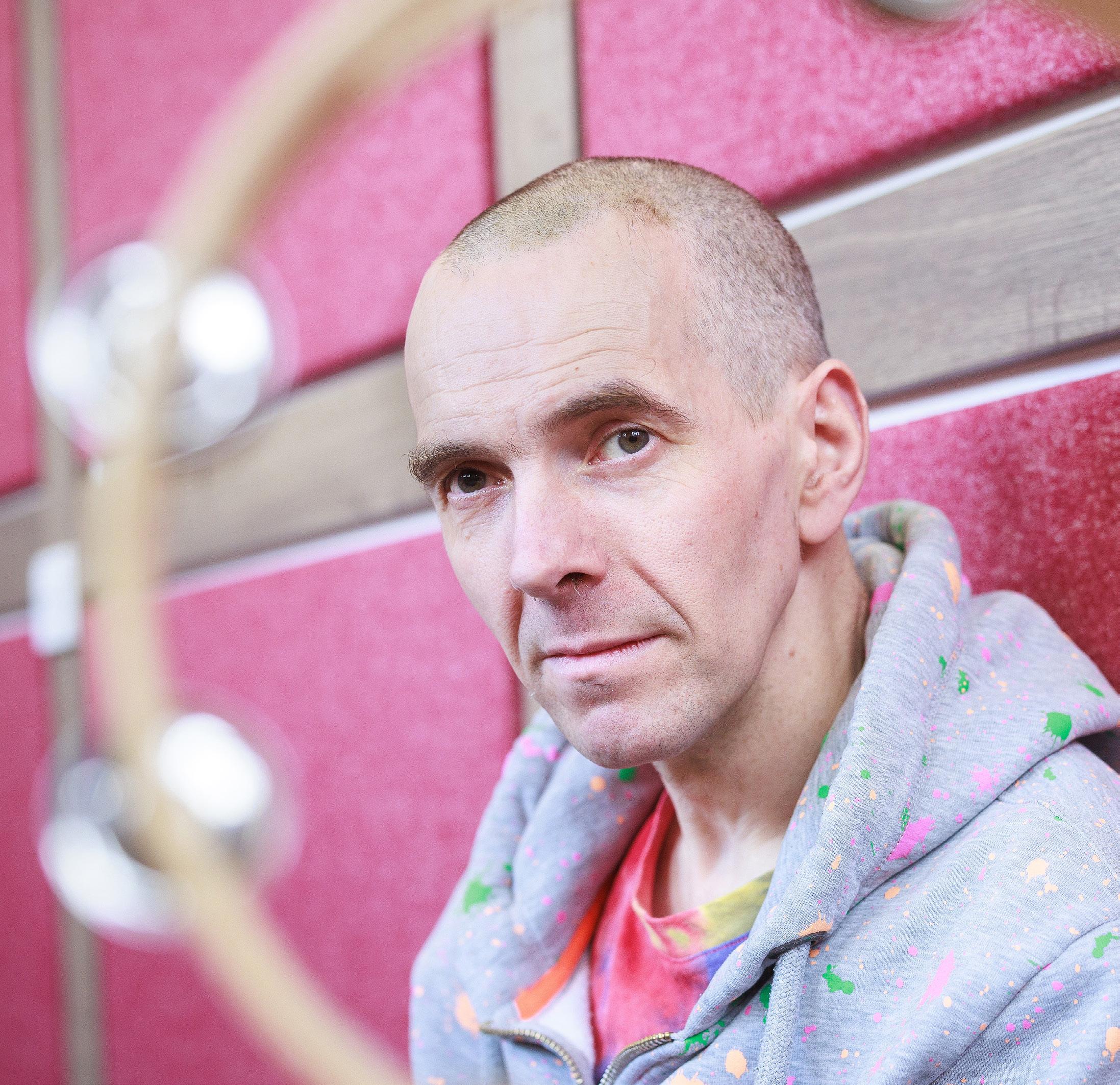
After losing his dad, supermarket worker James struggled with loneliness and depression. As part of his recovery, he joined the seven week ‘Making Music’ group run by Liverpool Philharmonic at The Life Rooms and has never looked back.
Though he had never played an instrument before, he embraced the chance to
test strings and tap keys until the rhythmic jingle of the tambourine stole his heart.
“When I lost my dad, something was missing in my life. I had no confidence and didn’t socialise much. Coming to The Life Rooms helped, but I wasn’t sure about the course at all at first. Now I’m hardly the same person I was before – it’s opened a door for me, I believe I’ve found my real niche in life.
“I have got strong new friendships from playing music in the group and I love playing the tambourine. It’s so interesting how you can hold it and shake it to make lots of different sounds.
“I was a shadow of the person I am now. I’ve done another course in musical theatre with the Liverpool Everyman through The Life Rooms, I’m thinking of going back to


Even if you think, you have no musical talent, you can still benefit from playing an instrument. Mersey Care psychiatrist Justine Croft is quite clear that her natural abilities might be limited.
“I’ve got no rhythm, two left feet and zero hand to eye coordination!”
Despite this, Justine has set up a mindful drumming session for women and children living in a hotel for asylum seekers – to the joy of all involved.
Justine believes it is therapy for all involved. “I may get to the end of a difficult working day and think ‘wish I didn’t have to do this’ but the joy on people’s faces makes it worthwhile every time. I always come away feeling better.
“There’s something about the beat of the drum - I wonder if it mimics the heartbeat we all hear in the womb or if it’s in our DNA. The drum is an instrument which just invites you to join in and feel connected to something bigger. And if I can play it, so can anyone!” college to study music and drama and I’ve booked lessons with a vocal coach on my day off from work.
“Being around music with other people helped me in my darkest hours. If music didn’t exist, I’d be a different person.”
“I wanted to offer a safe space for women and I needed an activity which can overcome a language barrier so we learned hand drumming together.”
Find out more
The Life Rooms offers support with opportunities to access courses, build confidence and meet new people.
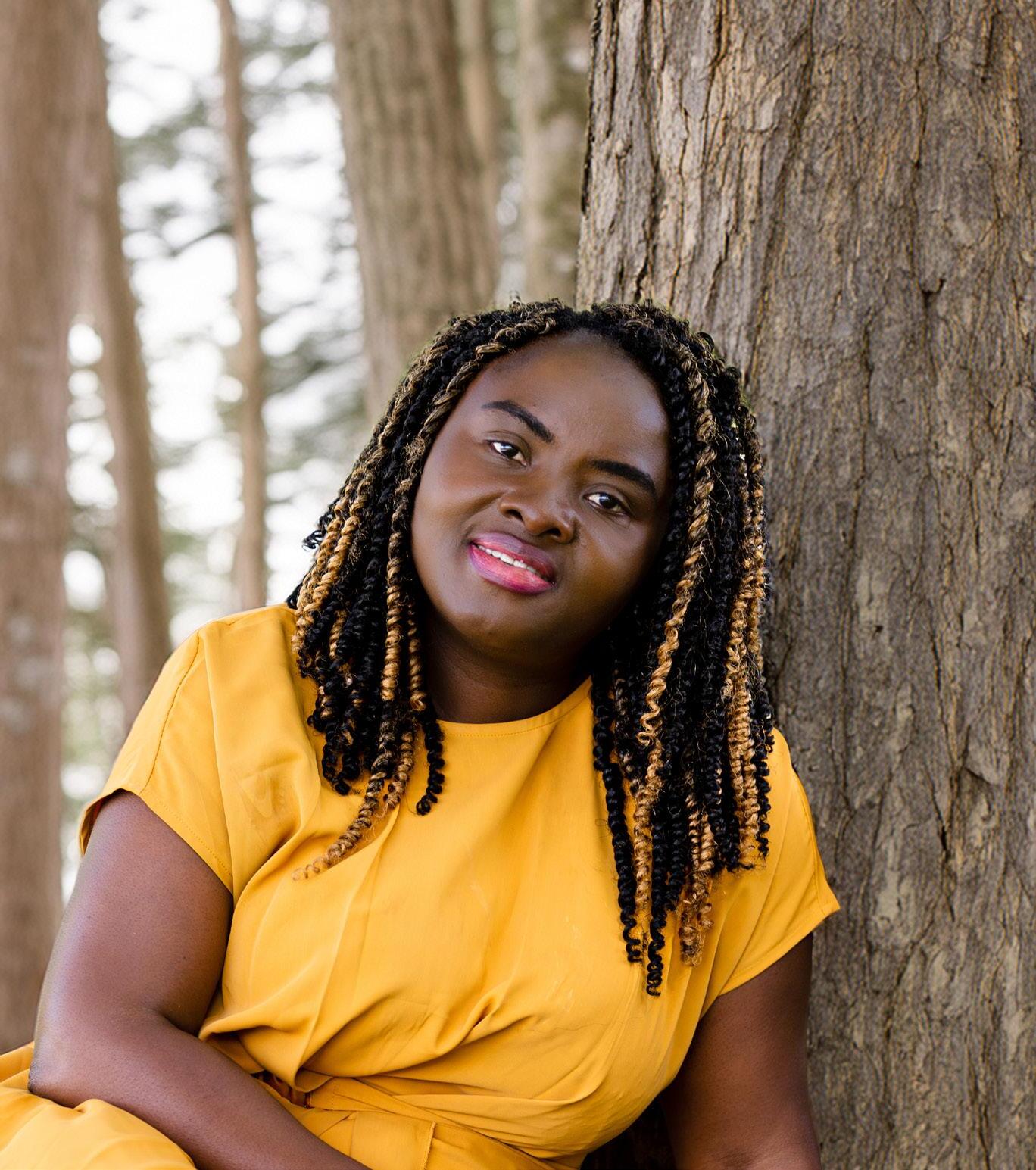
Busy lives can mean finding time for ourselves is hard enough and giving it to others seems like a step too far.
But a study from the NCVO (National Council for Voluntary Organisations) shows that connecting with other people, learning new skills and making a difference, can boost your own wellbeing.
Mental health nurse Justine Nakimuli Odwongo is clear about why she makes time to volunteer.
“It brings me joy and a real sense of purpose and fulfilment. Nothing makes me happier than seeing others smile.”
Connect Be active take notice
learn give

Justine moved to the UK from Uganda aged 18, to study to become a nurse. Since then, she has combined her full time job at Mersey Care with annual trips to her homeland, using her skills and training to increase awareness and challenge the stigma of mental health.
At first, the Ugandan health care system was a cultural shock to her. Traditional and religious beliefs mean mental health conditions can sometimes be seen as taboo, yet suicide rates are on the increase, especially amongst young people.
Justine talks to people in schools, universities and health centres across the country. She has helped set up mental health first aid courses in schools with mental health champions and clubs to help students
support each other. Travel and equipment costs are covered by the fundraising activities she organises throughout the year.
Justine’s husband Benjamin and daughters, Aaliyah and Aariana, actively support her fundraising, including organising a 300km run from South to North Uganda, promoting the link between physical fitness and good mental health.
Volunteering is woven into the fabric of Justine’s family. “I’m guided by the example of my grandmother and mother who were very community minded and always gave to others.”
An added benefit is that Justine feels volunteering re-energises her commitment to nursing back in Liverpool.

For volunteering opportunities at Walton Lea including gardening, crafting and bike repair, visit waltonlea.org.uk
If you work, check if your employer has a policy for time off for volunteering.
More ideas at royalvoluntaryservice.org.uk

“What I learn while volunteering profoundly informs my practice in the UK. It builds my resilience against racism and reminds me that my life is part of a vast, ongoing human story.
“It gives me space to listen more deeply and helps me understand how people’s experiences, culture and religion shape outcomes in life. Volunteering has made me a better nurse in the NHS.”
If you are considering giving volunteering a go, Justine’s advice is to explore different opportunities to see what you enjoy before you dive in.
“Once you’ve found what you love, you’ll never look back.”
Voluntary work doesn’t need to take over your life. Just a few hours a month can make a difference – for others and for you.
John Cantona Parry – known to his friends as Lemmy –was looking for a part time job after retirement. A friend inspired him to consider volunteering and he now spends a day a week at Walton Lea Partnership sharing his woodwork skills. The charity provides supported learning and work experience activities for people with learning disabilities in Warrington.
Lemmy worked most of his life in the chemical industry but his first ever job, more than 30 years ago, was as a joinery apprentice.
“I love making something beautiful out of wood, it’s a wonderful productive way to spend a day.
“As a charity we rely on donations, so we have to be creative with the equipment and materials we have. Thinking outside the box really keeps my mind active!”
Building a connection with others is one of the things Lemmy values most about his time at Walton Lea, especially his friendship with learners like Jamie.
“We get on so well, we have great banter between us.
“The day flies and it’s really rewarding to see people develop new skills and to know I’ve been a part of that.”

When she sashayed onto the Strictly dance floor for the 2025 series of the hit BBC show, Ellie Goldstein was making history for the second time. Already the first ever model with Down’s syndrome to grace the cover of British Vogue, she is the first contestant with the condition to compete in the main series of the celebrity ballroom dancing competition.
A self confessed Strictly superfan, Ellie described being part of the show as her
‘dream come true’. She and dance partner Vito Coppola, the self-styled Cheeky Team, made it all the way to Hallowe’en Week, being voted off in a dance-off with Eastenders actor Balvinder Sopal and partner Julian Caillon.
In a backstage interview during the competition, Ellie said,
“Dancing on this stage makes me feel strong, sassy, confident and completely myselfI’m loving every single minute!”
Although she’s never danced professionally, Ellie has been a keen dancer since the age of five, starting lessons to help her recovery from surgery for a hole in her heart.
Despite doctors telling her mum, Yvonne, when she was born that she would never walk or talk, performing on stage is one of Ellie’s biggest passions. Speaking on the show, Yvonne explained, “We decided to bring Ellie up as Ellie, not with a title of having Down’s syndrome. I think that’s made a difference in her life. I’d like people to see that anything is possible.”


In week three of her Strictly challenge, Ellie danced the Samba to Dance the Night Away from the hit movie Barbie – when she and Vito embodied the famous doll and her friend Ken.
When toy company Mattel launched its first doll with Down’s syndrome in 2023, Ellie said she was ’so happy’ to be an ambassador.
The doll wears a blue and yellow dress with butterflies, symbols associated with Down’s syndrome awareness. Her pink pendant necklace with three upward chevrons represents the three copies of the 21st chromosome - the genetic material that causes the characteristics associated with the condition.
These also represent ‘the Lucky Few’ who have someone with Down’s syndrome in their life.

The trailblazing model, actor and author is also the UK ambassador for the first Barbie doll based on a female with Down’s syndrome and she uses her platform to inspire others. In her cover interview with Vogue, Ellie made her feelings clear. “I have Down’s syndrome but it doesn’t define me. It’s actually the least interesting thing about me. I always wanted to be a model but I didn’t see anyone who looked like me on magazine covers so I wasn’t sure if I could do it but now, I am living my dream.”




Inclusive dance organisation DanceSyndrome



Fear of falling can stop us doing things we love as we get older but we can all help ourselves to reduce the risk.
A third of people over 65 and 50 per cent of people over 80 fall at least once a year but keeping active is key to staying steady. Doing exercises which improve strength, balance and flexibility at least twice a week can make all the difference.


Chest stretch, this is good for posture:
• Sit upright away from the back of the chair, shoulders back and down. Extend arms to the side
Mersey Care physiotherapist, Ewelina Roman says it doesn’t need to be a vigorous workout.
“If you have mobility problems - or don’t want to go outdoors in the wintertry chair based exercises.”
Eating well and staying hydrated can also reduce the chances of a fall. Aim for carbohydrates like a slice of wholemeal toast before doing any exercise and try to include foods in your diet which contain calcium for bone
health. Dairy products including milk, yogurt and cheese, leafy vegetables like spinach or broccoli and nuts will all help.
“The most important thing is to do what you can, when you can, whether that’s a brisk walk or exercising from your armchair. Moving more is always beneficial, however you do it.”
Speak to a GP first if you haven’t exercised for some time or if you have medical conditions or concerns.
• Gently push your chest forward and up until you feel a stretch across your chest
• Hold for five to 10 seconds and repeat five times.
Upper body twist, this will develop and maintain flexibility in your upper back:
• Sit upright with your feet flat on the floor, cross your arms and reach for your shoulders
• Without moving your hips, turn your upper body to the left as far as is comfortable. Hold for five seconds
• Repeat on the right. Do five times on each side.
Find more sitting exercises here
• Choose well fitting footwear with non-slip soles and ankle support
• Keep driveways and paths clear of wet leaves. Use grit or sand to de-ice surfaces in cold weather
• Learn the ‘penguin walk’. Keep your centre of gravity over your feet, take shorter steps and go slowly
• Make sure any walking aids are fitted with nonslip tips
• Plan ahead to avoid rushing outdoors in icy conditions.
Avoid indoor trips
• Make sure your home is well lit. Remove hazards like rugs, cables or clutter
• Use non slip mats in the bathroom and mop up spills on floors
• Keep things within reach and get help moving items that are heavy
• Check your eye and hearing tests are up to date.

Stay well feel great

A dedicated falls prevention programme has been developed by staff at Mersey Care’s Longmoor House Reablement Service to help patients who have been in hospital get back to being as mobile and independent as possible.
Read Mersey Care’s booklet, How to overcome the fear of falling at: bit.ly/MC-fallsprevention
The ‘Ready, Steady, Go’ programme starts with movements which can be done in bed through to chair exercises. As patients get stronger and more
confident, they are encouraged to walk independently following footprint trails around the wards.
Ward manager Joseph Cullen, who helped create the ‘Ready, Steady, Go’ campaign says, “When people have been ill and lost muscle strength or have a health condition which affects their mobility, exercising can be the last thing on their mind. But moving more - even when you’re lying in bed - can help get you back on your feet.”
hen days are short, it’s tempting to stay indoors. But as the light fades, your energy levels, immune system and mood can dip too. Planning for ways to stay active and well will help you thrive during the coldest season.
Vitamin D is crucial for strong bones, a healthy immune system and good sleep. Foods like fish and leafy vegetables help but getting outdoors for 20 minutes around midday is ideal.
Even on cloudy days, beaches are bathed in more mood enhancing natural light than built up areas. Walking on sand is also great exercise. Keep warm by layering clothes. Keep your head covered and use a scarf over your nose to warm the air before it enters your lungs.
Prepare a first aid kit with paracetamol, ibuprofen and cold remedies, a thermometer and treatments for indigestion and diarrhoea.

NHS advice is that everyone should consider a daily vitamin D supplement during winter.
Protect your immune system by washing your hands regularly and get a flu jab if you’re eligible.
Choosing the right service for your health care needs will free up A&E for those who need it. Your local pharmacy can treat sinusitis, sore throat, earache, impetigo, insect bites, shingles and urinary tract infections (UTIs). For medical help fast, call NHS 111 and for minor injuries and illnesses visit your nearest urgent treatment or walk-in centre.
Check symptoms before taking a poorly child to hospital at alderhey. nhs.uk/conditions/symptoms-checker
For more details, visit merseycare. nhs.uk/helpus-helpyou
• Formby – the pine woods offer shelter and protection if the winds are too strong
• New Brighton – the promenade is ideal for a safe, flat winter walk. It also offers accessible toilets and parking
• Hoylake and West Kirby – flat sands with beautiful views.
Find a group walk or route suggestions near you at ramblers.org.uk

More than just a wage packet, research shows having a job we enjoy builds self esteem and improves our quality of life.
For Ariko, returning to work was central to her recovery after a difficult period with her mental health. Frequent moves as a child meant she often felt lonely and isolated. Channelling her energy into what she could control, she pushed herself to excel, not sharing how low she was feeling. She now recognises the pressure she put herself under.
“I couldn’t tell anyone how I felt because it was too big.”
University during the COVID pandemic led to constant anxiety. As her mental health declined, life at home and work became untenable.
Referred to Mersey Care for support, Ariko received counselling and employment guidance through The Life Rooms. There, she met Arthur Cosgrove, part of Mersey Care’s
IPS (Individual Placement Support) service.
Employment specialist, Arthur says, “Work was important to Ariko. We help people find jobs that are right for them, which fit their skills, confidence and circumstances.”
With Arthur’s support, Ariko found a part time role with a footwear retailer. He stayed in regular contact with her through the first six months.
“Getting back into work gave me routine, connection with other people and a sense of purpose.
Arthur really took the time to make sure it was manageable,” she says. “He wanted it to be something I could sustain, without it becoming overwhelming.”
As her confidence grew, so did her hours and responsibilities. Ariko is now assistant manager
and is enjoying a healthy worklife balance.
“Being championed by Arthur gave me the motivation I needed. He helped me believe in myself again.”
Arthur adds, “Seeing Ariko’s progress has been fantastic. She’s a great example of how the right support can help someone rediscover confidence and independence through meaningful work.”
For Ariko, the journey has been about more than employment. “It’s about feeling capable again. The future is looking much brighter.”
If you have a serious mental health condition, you can refer yourself for employment support. You must be of working age and have the right to work in the UK.
“The most common way people give up their power is by thinking they don’t have any.”
Alice Walker, Author, The Color Purple.
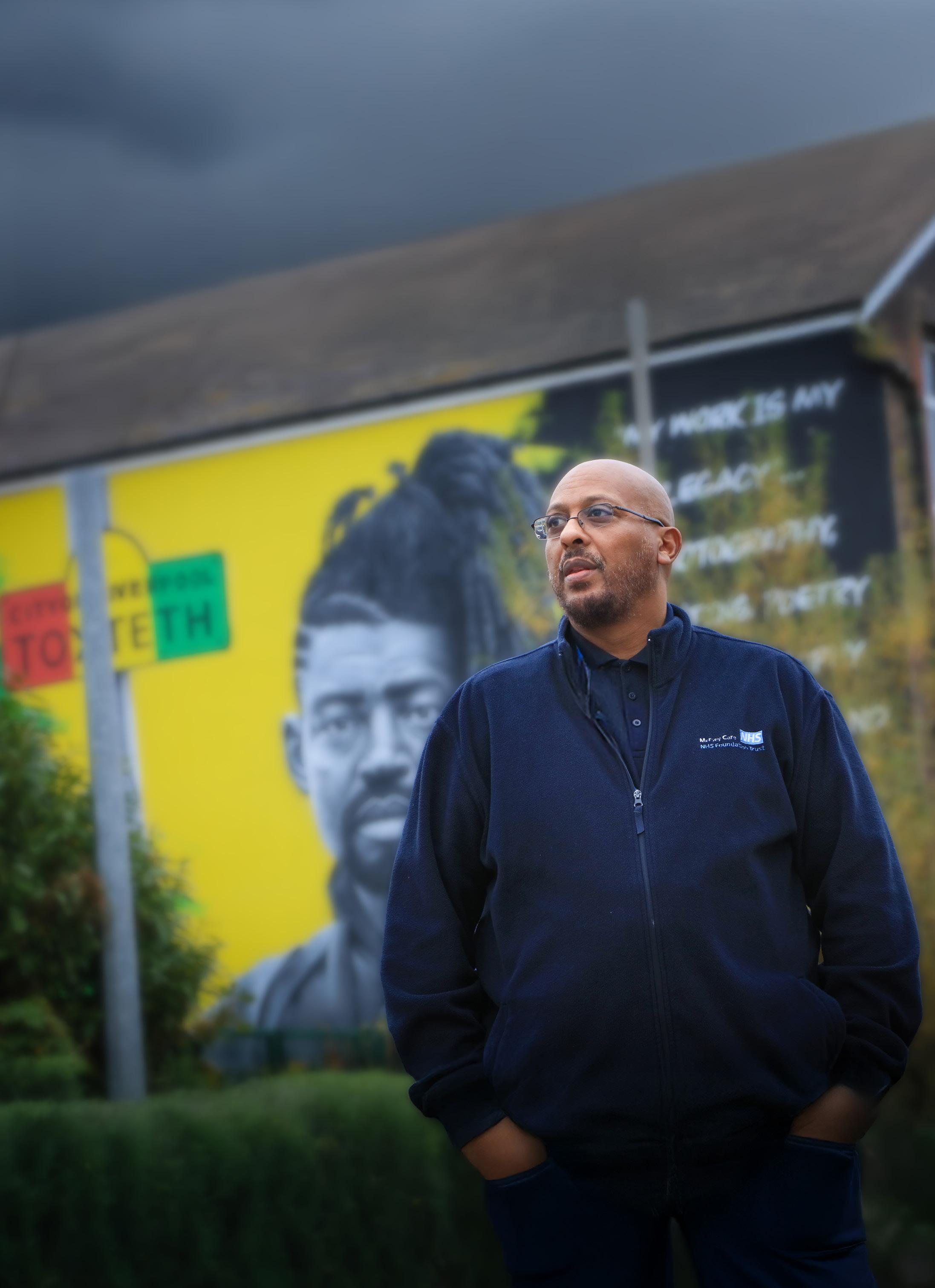
The theme of October’s Black History Month was Standing Firm in Power and Pride. Rachel Robinson talks to project manager Abdi Ahmed about his life, beliefs and hopes for the future.
I was born and raised in Granby Street, Toxteth, in a close knit, multicultural community where our neighbours were Indian, Irish, English and Jamaican. As children, we’d share meals at each other’s homes, enjoying the richness of different cultures through food and friendship.
My passion for education and equality was shaped by places like the L8 Law Centre* that offered support and hope. Despite the political unrest, racial tensions and unemployment challenges of 1980s Liverpool, I have beautiful memories and Toxteth stood out to me as a thriving example of multicultural unity.
*The L8 Law Centre was established after the 1981 uprisings to defend and empower the local community.
I deeply admire global icons in black history like Muhammad Ali and Nelson Mandela but I believe it’s just as important to celebrate local heroes who’ve shaped our communities.
As a teenager, I was inspired by Liverpool activists Maria O’Reilly, Rashid Mufti and Wally Brown, who helped shape the Toxteth of today. They’ve since
built on the legacy of activism that defined the area in the 1980s and remind us that real change often begins at grassroots level.
Maria was my mentor back then and I’ll never forget her mantra, ‘Education, education, education’.
Growing up, I dreamed of becoming a doctor but in my community that felt out of reach. I was swayed by the promise of opportunity in IT and studied Business Information Systems but my passion lay in mental health and advocacy and I joined the NHS. I was determined to amplify the voices of ethnic minorities, a mission I’ve carried for a quarter of a century. I’m proud to have built a career rooted in purpose and impact.
I believe real change can’t come from one person alone - it needs collaboration.
In my role as Equality, Diversity and Inclusion Lead (in Secure Care), I work closely with doctors, nurses,
Wally Brown’s life as a youth leader worker at the Methodist Centre in Toxteth established him as one of the most respected men in Liverpool 8 by young people.
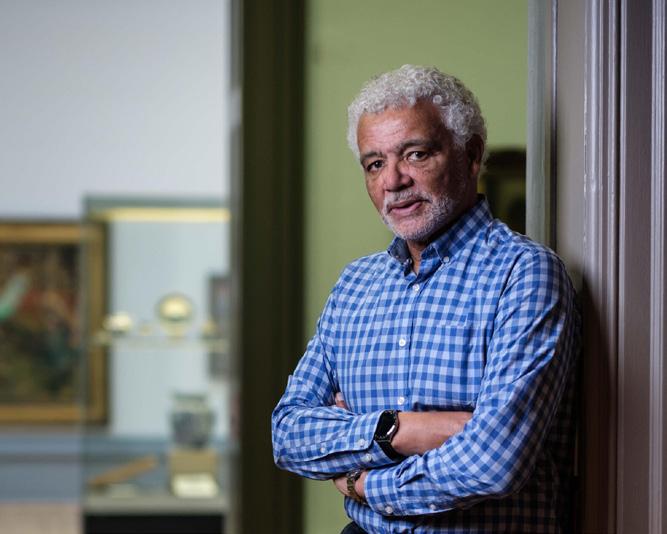
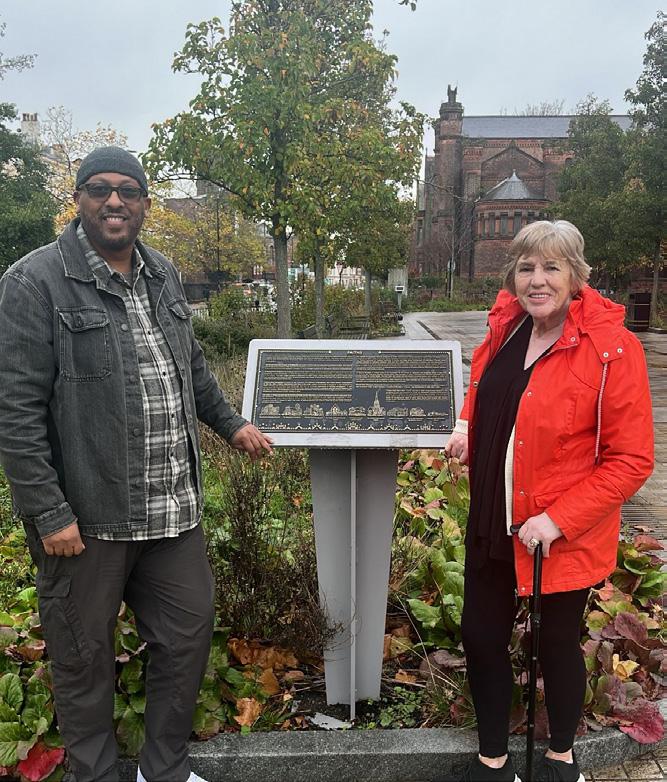
An activist from a young age, Maria fought tirelessly for the rights of people arrested as part of the Liverpool 8 uprisings in 1981. She is a patron of Mandela8, the Liverpool charity supported by Nelson Mandela’s daughters, to educate young people with the skills to uphold racial justice and equality. Mandela8.org.uk
carers and other colleagues supporting patients, communities and staff. It’s vital that they have a voiceand that we listen - because they are the true experts.
What’s most encouraging is that everyone is paying attention, including leaders. That’s when change happens.
One of my greatest joys is witnessing people of colour finally stepping into leadership roles. It would have rarely happened in my mum’s generation. Today we have nurses educated in other countries, we see role models at director level. These are not token gestures, they’re an integral part of a set up that helps people thrive.
I’ve seen real progress in anti racial education and a desire to learn about other people’s culture. While racism hasn’t disappeared, there’s now more friendship and understanding.
Helping people from ethnic minority backgrounds - many with no prior experience - into mental health and watching them grow.
My dream is to start a charity to inspire young people to believe they can become someone. For now, my greatest reward is when someone I’ve supported comes back to tell me how well they’re doing. Changing one life can spark a ripple
“It wasn’t a political decision – we’re from Liverpool – all the bands, black, white, we all just played together.”
Paul McCartney in 1964, after The Beatles refused to play for segregated audiences in the United States.

effect because they can go on to change others.”
When Abdi persuaded his daughter against attending an event in London, it was prompted by a fear of racial abuse from demonstrators at a nearby anti-immigration march. It was a graphic reminder of days when, as a young man, he would run a gauntlet of abuse while walking to work.
“We were worried about her. It’s a bad feeling telling your child, ‘You can’t go because this march is going on’. It took me back to the 80s when my friends and I wanted to venture into Liverpool city centre. Our parents told us to stay local, scared we’d be beaten up or chased by police or worse. Kids don’t understand, they think, ‘Why do these people hate me?’”
He’s concerned about current negativity towards immigrants and that there is a false rhetoric
that people from other ethnic backgrounds don’t make a contribution.
“My wife, my entire family, work in the NHS - we all contribute. My father, grandfather and uncle came from Somalia and served in the British forces. They helped make Britain what it is today.”
He’s still hopeful things will get better.
“In Liverpool my life has been shaped by friends, some I’ve known all my life, others I’ve met along the way. Those relationships have taught me, although we’re different in nationality and skin colour, we share a deep bond. We may come from different backgrounds but we are still brothers. That sense of connection and mutual respect is what gives me hope for the future.”


A new photographic exhibition in Liverpool tells the story of Toxteth’s black musicians of the 1950s and 60s, whose influence reached The Beatles and beyond.
The free exhibition runs at University of Liverpool’s Victoria Gallery & Museum until 26 April 2026. It is presented by the VG&M in partnership with Mandela8 and arts development organisation, Northern Roots.
Black History Month was first celebrated in the UK in 1987. We asked staff at Mersey Care what it means to them:
“I am the legacy of strength, compassion and brilliance. As a black nurse, I carry the wisdom of my ancestors, the courage of my community and the pride of my purpose - not just in October, but every single day.”
Chengeto Shoko, Nurse Consultant
“The opportunity to celebrate the amazing achievement our black colleagues have made and continue to make to our services. We know there is more to do to make sure we see more black leaders in our organisation. For me, it is a time to celebrate and reflect.”
Jennifer Yau-Willis, Senior People and Organisational Development Business Partner
“A time to recognise and celebrate the rich history, culture and contributions of black people in Britain. We celebrate past achievements but also confront the ongoing challenges we face and experience.”
Roderick Thebe, Charge Nurse and MECN (Multi Ethnic Colleagues Network) Joint Chair
“A celebration of resilience, excellence and the countless contributions black people have made to every facet of society. It’s about the everyday struggles black people have faced and continue to face, breaking down barriers, educating and advocating for equality and fairness.”
Solomon Gwatidzo, Senior Clinical Nurse and MECN Joint Chair

Stacked on supermarket shelves and social media feeds, protein is a booming industry. Often priced at a premium, protein bars, shakes and supplements have become the latest dietary fad, particularly amongst the under 30s. But do we need to buy special foods or can we stay fit and healthy from our diet alone?
Known as the body’s ‘workhorse’, protein is vital to build muscle, fight infection, regulate hormones and repair skin, nails and bones. It breaks down into amino acids that help the body grow and repair.
As a general rule of thumb, adults need about 0.75 grams of protein per kilogram of their body weight every day. That’s about 45g a day for a 60kg (9.5 stone) woman or 55g a day for a 75kg (11.8 stone) man. Your age, weight
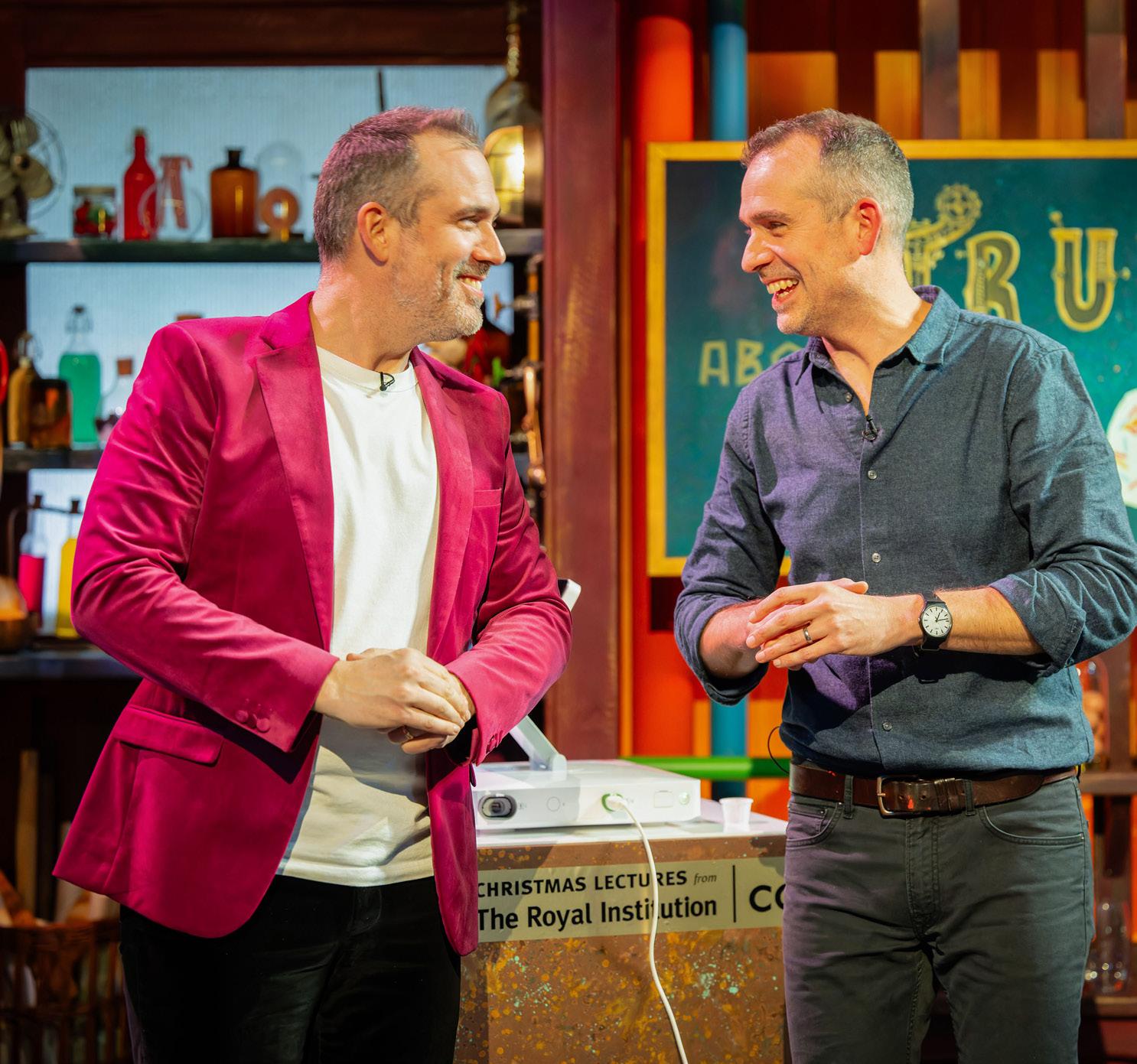
and level of physical activity will also affect how much you need daily.
Mersey Care dietitian Obianuju Chike says, “For a healthy adult, we would recommend eating high protein foods like legumes (beans and pulses), dairy, eggs and fish in two or three meals each day.
People over 40 and women who are breast feeding or menopausal, might need more protein to help maintain muscle mass. Eating more protein rich food during pregnancy helps support the baby’s development while professional athletes or sportspeople also need higher amounts because it provides the amino acids that help their muscles recover.
“Consuming proteins from minimally processed food provides a complete nutritional profile, which includes essential
vitamins, minerals and fibre,” says Obianuju.
“It is possible to get all the essential amino acids you need in your diet, even if you are working out regularly.”
The key to healthy eating is always to get the right balance. Too much protein can cause as many issues as too little.
Obianuju says, “Excessive amounts of protein - through food or supplements - can put extra stress on the kidneys and liver, increasing the risks of dehydration and kidney stones. It can also cause digestive issues due to low fibre intake or excessive dairy consumption.”
Certain medical conditions affect how much protein you should consume. If you have any concerns, contact your GP or dietician.
In the BBC Sounds podcast What’s Up Docs, TV doctor Xand van Tulleken spoke to Nita Forouhi, Professor of Population Health and Nutrition at the University of Cambridge. As a regular gym goer, he asked whether he should consider himself an athlete and use protein supplements.
NIta said, “Unless you’re a competitive elite athlete, you’re unlikely to benefit from protein products and excess amounts could lead to weight gain. Getting what you need from whole foods – meaning food which is not highly processed –is always better.”

Include protein throughout the day rather than concentrating it in one meal.
Good sources of about 25 to 30g include:
• 100g of lean meat or fish, like salmon, tuna and cod
• Two eggs or 100g of cheddar cheese
• Protein rich vegan options include beans, nuts, seeds and soya (around 7g protein in every 100g).
NHS Healthier Families has lots of recipe ideas and includes the nutritional information for each dish - nhs.uk/healthier-families/ recipes
Protein rich snack combos:
• sliced apples or bananas with almond or peanut butter
• hummus with vegetable sticks
• cottage cheese with fresh fruit
• yoghurt with berries and nuts.
A high protein breakfast makes you feel fuller and can help weight management. Try scrambled eggs on toast with cheese on top or overnight oats made with Greek yoghurt, topped with almonds.
Breakfast 25g protein
Eggs on toast
15g protein - 2 poached eggs
9g protein - 2 wholegrain toast
1g protein - hot drink with 30ml low fat milk
Lunch 25g protein
Cottage pie with lentils
3g protein - 100g rice and quinoa
4g protein20g feta
2g protein - 1 tbsp pumpkin seeds
10g protein - 45g chicken or 75g chicken style Quorn
21g protein - 90g beef mince
4g protein - 40g lentils
Add 1 tbsp cheese on top for an extra 4g protein
6g protein - 100g low fat Greek yoghurt
dinner and supper
25g protein
Chicken and rice

Designed to prioritise privacy, dignity and recovery, Mersey Care’s new facility at Mossley Hill is a major milestone, marking the end of mental health care dormitory wards in Liverpool.
Every patient will now have a private ensuite bedroom and airy communal areas filled with natural light. There is also a gym and therapeutic activity rooms for art and music. All patients will have access to beautiful gardens and outdoor spaces which were crucial to the design

of the truly therapeutic environment, supporting their recovery.
Wards and facilities have been named to reflect Liverpool’s rich culture and history, while family friendly spaces and the multi-faith room promote inclusivity and a real sense of community.
A testament to collaboration, service users, carers, staff and community stakeholders have all played a role in shaping its design. Together they have created a modern, yet welcoming space that offers
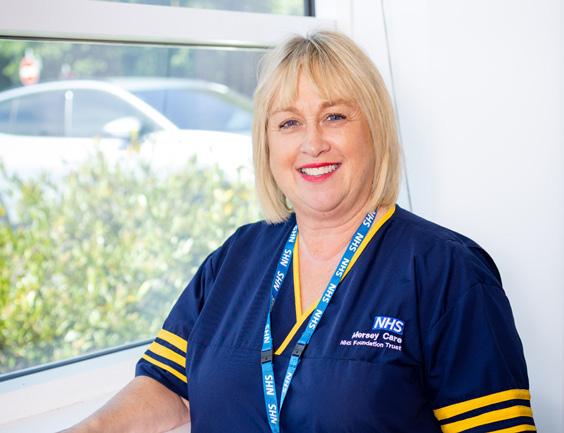
hope and opportunity for people experiencing a mental health crisis.
Jenny Hurst, Chief Nurse at Mersey Care, says, “Mossley Hill has been a decade in the planning and is so much more than bricks and mortar. This outstanding new facility is a symbol of progress, compassion and resilience. As a nurse, I know that this marks the beginning of a new chapter for our staff and patients in the treatment of mental health. It is a fantastic opportunity to deliver perfect care.”

ife is busy for Tashi Thornley. Between tap dancing, marathon training and football, she performs on stage with her punk band, Pete Bentham and the Dinner Ladies. Her goal as a service user governor for Mersey Care is to spread the word that the future of health services depends on governors who break the mould.
“You might hear the word ‘governor’ and imagine someone very different from me. When I was elected seven years ago, I was the youngest governor Mersey Care had ever had. But my generation and those younger than me are the people who will rely on the health services of the future. If we don’t get involved to help shape what is on offer by sharing our experiences and views, how can the Trust develop the services we need? To stay
relevant and useful, it’s crucial to get input from people from all walks of life.
As a student in Leeds 15 years ago, I served as a student representative, then was elected on to the student union as Vice President Education. My experience is that my opinion counts and I can be part of making change happen.”
Tashi is also passionate about focusing on early intervention in mental health and inspiring people to talk openly. “As a governor, I think it’s important to encourage people to share their stories. I know from the treatment I received for my mental health that good services can change lives. And now I’m a governor, those experiences

during one of the most difficult times of my life, are helping me make a difference for others. I see that as a really positive outcome.
Good health – physical and mental – is crucial. Having health services that meet our needs is the only way to make sure that we, our families and our communities, will live the best life possible.
It’s a great feeling to know I’ve made a difference and that I can inspire more people to get involved too. Everyone should consider being a governor - never underestimate how important your voice is.”
Our service users, carers, staff and members of the public have the opportunity to influence the way our health services are run. Find out what it means to be a governor by visiting merseycare.nhs.uk/councilgovernors



Visit www.merseycare.nhs.uk/HelpUsHelpYou for a range of resources to help improve your health and wellbeing, including how to access urgent mental health support. Or you can get help from the following services. Self care
Keep a well stocked medicine and first aid cupboard for minor ailments



